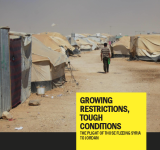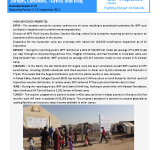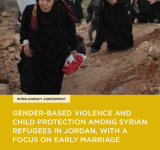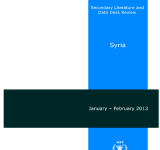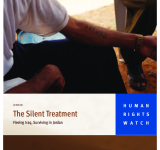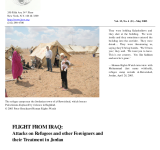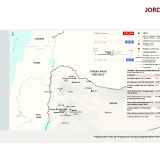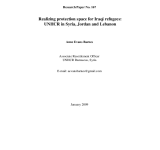يستند مضمون هذا التقرير المتعلق بالأردن إلى حد كبير إلى زيارة بحثية قامت بها منظمة العفو الدولية إلى البلاد في يونيو/حزيران 2013. وقد التقى وفد المنظمة بممثلي السلطات الأردنية ووكالات الأمم المتحدة والوكالات الإنسانية الدولية والمنظمات غير الحكومية والجمعيات الخيرية;; فضلاً عن أكثر من 150 لاجئاً من سوريا في مجتمعات اللجوء والمجتمعات المضيفة. ونشرت منظمة العفو الدولية هذا التقرير بهدف لفت الانتباه إلى الصعوبات التي يواجهها الفارون من سوريا طلباً للسلامة. وفي الوقت الذي يركز فيه التقرير بشكل رئييس على الأوضاع في الأردن;; فإنه يتضمن تحديثا للمعلومات التي كانت المنظمة قد نشرتها في السابق بشأن التحديات التي يواجهها اللالجئون من سوريا في البلدان المجاورة. وقد أمعنت منظمة العفو الدولية النظر في التحديات التي يواجهها اللاجئون في الأردن;; ولا سيما أولئك الذين يقطنون في مخيم الزعتري;; وهو أضخم مخيمات اللاجئين من سوريا في الأردن. وأجرت المنظمة تحقيقاً حول معاناة اللاجئين;; ليس من ظروف المعيشة القاسية في الصحراء فحسب;; وإنما أيضاً من ارتفاع معدلات الجريمة وغيرها من المخاوف الأمنية.
refugee
During the reporting period;; World Food Programme (WFP) distributed a total of 340;;000 hot meals (an average of 52;;000 meals per day) through its implementing partners TUA;; Thaghar Al Madina;; and Radi Shedifat in Al Za'atari camp and King Abdullah Park. In addition;; WFP provided an average of 4;;213 welcome meals to new arrivals in Al Za'atari Camp. The following report details such endeavors.
This report is the product of a meeting between The Ministry of Planning and International Cooperation (MOPIC) and the United Nations team regarding displaced Syrians in Jordan. It assesses the overall situation;; along with the humanitarian needs and coping mechanisms of Syrians in Jordan;; and provides a framework for relief interventions.
The purpose of this desk review is to uncover the food security and nutrition information available on the three target countries;; to advise WFP on the absence of any relevant information that would prevent a comprehensive evaluation of refugee food security status;; and to provide guidance on areas for primary data collection during the March 2013 Joint Assessment Mission (JAM).
بعد الفرار من العنف والاضطهاد في العراق;; فإن مئات الآلاف من العراقيين الذين يعيشون في الأردن يواجهون تهديداً يومياً للإعتقال والغرامات والترحيل وذلك لأن الحكومة الأردنية تعاملهم معاملة المهاجرين غير الشرعيين بدلاً من معاملتهم كلاجئين. منذ بدء الحرب في العراق في عام 2003;; نزح أكثر من مليون عراقي من بلدهم طلباً للجوء من البلدان المجاورة;; إلا أنه لا يوجد أي من الدول المجاورة للعراق;; ولا الولايات المتحدة;; يعاملونهم كلاجئين. وهذا التقرير يلقي الضوء على محنة اللاجئين العراقيين (والتماس الحلول له) وهي مسؤوليةً مشتركة بين الأردن والدول المجاورة والمجتمع الدولي.
Attacks and harassment amidst the security vacuum in Iraq forced refugees and other foreigners to flee the country and become refugees again;; this time in Jordan. Based on research in Baghdad and Jordan;; this 22-page Human Rights Watch report details the abuses against refugees and foreigners in Iraq;; as well as their treatment upon arrival in Jordan. Housing is frequently the pretext for the violence and harassment. Many landlords;; forced by the previous government to take Palestinian tenants at discounted rates;; are taking advantage of the breakdown in law and order to evict Palestinian tenants from their homes or to extort unrealistic rent increases from them. In other cases;; violence and threats have come from individuals who seem to have no legitimate claim to the property. Human Rights Watch criticized Jordanian authorities for limiting refugees' entry to Jordan and recommended that Jordan provide immediate protection and assistance to all refugees;; including those currently trapped near the Jordanian border in accordance with international refugee law standards.
This report outlines the regional response plan to Syrian refugees. It gives an overview of the situation of Syrian refugees in Jordan;; the plans and strategies that have be put in place to accommodate them. The overarching priorities in 2013 remain the registration and documentation of new arrivals;; basic protection;; and life-saving activities;; specifically: the establishment of adequate camp infrastructure;; provision of non-food items (NFI) to new arrivals in camps;; access to health care;; food assistance;; access to clean water in camps;; and physical protection including response to and prevention of sexual and gender-based violence (SgBV). Other essential activities include the identification and protection of unaccompanied and separated children (UA/SC);; access to education services and subsistence aid to the most vulnerable among the non-camp refugee population;; and improving access to water in refugee- hosting communities.
This paper looks at how UNHCR has gone about creating;; maintaining and expanding protection space for Iraqi refugees in the context of the Jordan;; Syria and Lebanon. The paper is divided into two parts. The first touches on UNHCR's mandate and the 1951 Convention Relating to the Status of Refugees;; which together provided;; for the first time;; a formal structure for the protection of refugees under international law. The second part of the paper turns attention to the Iraqi displacement to Syria;; Jordan and Lebanon. It begins by outlining the protection environment as regards refugees in the region and indicates the protection needs faced by Iraqi refugees;; or rather rights which remain be realized by Iraqi refugees in these countries.
